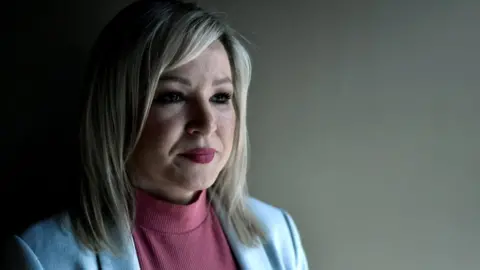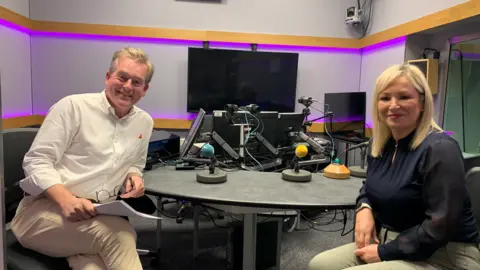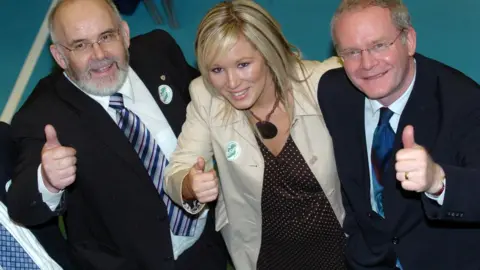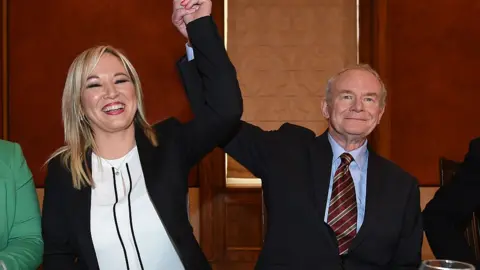Michelle O'Neill says she was prayed over when pregnant at school
 Reuters
ReutersSinn Féin deputy leader Michelle O'Neill has said she was prayed over at her school when she became pregnant.
Ms O'Neill also said that the school created a "huge fuss" when she returned to do A-levels after her daughter was born.
She recalled her experiences to host Mark Carruthers, in the first of a series of special Red Lines programmes.
The programmes are available as podcasts on BBC Sounds and will be broadcast on BBC Radio Ulster.
As Sinn Féin won the most seats in May's assembly election, Ms O'Neill is due to become first minister if power sharing is restored at Stormont.
The Mid Ulster assembly member, who was born in 1977, talked about her time at school in the 1980s and 1990s.
She became pregnant at 16 while studying for GCSEs at St Patrick's Girls' Academy in Dungannon, County Tyrone.
Ms O'Neill said her form teacher at the time of her pregnancy "was absolutely amazing to me and very understanding that you're not like every other 16-year-old".
"You're trying to do your GCSEs maybe having been up all night the night before with a child with a sore ear," she added.
"Unfortunately my reality was that not everybody in the school was as supportive.
"It was a Catholic grammar.
"A 16-year-old girl being pregnant was frowned upon and they wouldn't have been the kindest in terms of their approach to supporting me at that time."

When asked by Mark Carruthers if she felt the Church had played a part in the school's approach, Ms O'Neill said some in the school had prayed over her.
"It was actually when I'd just got pregnant. It was nearly like, you know, that I had sinned and therefore I must be prayed upon which obviously was not the right approach," she said.
"My parents made that clear also to the school leadership at the time."
Ms O'Neill said that despite her daughter being born six days before her first GCSE exam, she was determined to sit them as she wanted to return to study for A-levels.
"I remember turning up for sixth form having achieved my GCSEs and the required amount to go back in to do A-levels and I remember the school creating a huge fuss that I hadn't asked for permission to come back to the school," she said.
"It was my right to come back to the school to finish my education.
"They caused a whole fuss and a whole fuss in a school assembly which was quite an embarrassing experience."
Ms O'Neill also said that she had never been invited to St Patrick's Academy to talk to pupils but she would "of course" go if invited.
"I have my own lived experience, but the young people that are at the school are entitled to have access to their politicians and have people come in and talk to them," she said.
 Pacemaker
PacemakerThe Sinn Féin deputy leader, though, said she had returned to her primary school.
"I had a great experience in my primary school - fabulous teachers," she recalled.
"Their kindness always shone through, they were just really decent people and it was a very pleasurable experience."
In a statement, the board of governors at St Patrick's Academy said they were sorry to hear of Ms O'Neill's experiences "at what was a very difficult time for her" but were also heartened by by the actions of her form teacher.
"The approach taken to young people in this situation is now very much one of compassion and pastoral support, underpinned by the RSE and pastoral care policies," the statement added
"Michelle has shown great tenacity and fortitude both then and in the intervening years, and she is certainly a role model to young women today."
Ms O'Neill also talked about how her interest in politics developed.
Her father, Brendan Doris, was a Sinn Féin councillor and former IRA prisoner.
"We wouldn't have been a house that sat down at the kitchen table to talk about politics every day," she said.
"However, some of it was a little unavoidable because of the fact that my father was a Sinn Féin councillor, the fact that previous to that he was an ex-prisoner."
 Getty Images
Getty ImagesShe said, however, that it was the "extraordinary circumstances" of Northern Ireland and the society around her that shaped her political beliefs.
"You're born into a society that actively discriminated against you," she said.
"I remember getting my driving lessons and I remember being stopped by the local RUC.
"They actually gave me, I'm not sure it was a fixed penalty notice then or a fine, for not wearing a seatbelt whenever I was wearing a seatbelt.
"The words of those officers to me were: "Well it will be your word against ours, and we know who's going to come out on top of that."
"So that's the active discrimination that you lived in in society at those times.
"It sounds quite trivial in terms of what happened in the conflict, but that's my experience of something actually happening personally to me, outside of everything else that was happening at that time."
When asked about IRA violence, Ms O'Neill replied: "I think at the time there was no alternative."
"Now, thankfully, we have an alternative to conflict and that's the Good Friday Agreement.
"My whole adult life has been building the peace process.
"I wish the conditions were never here that actually led to conflict.
"The only way we're ever going to build a better future is actually to understand that it's OK to have a different take on the past.
"My narrative is a very different one to someone who's perhaps lost a loved one at the hands of republicans."
Mark Carruthers' counterpointed what Michelle O'Neill said about her views of the security services, suggesting that others would see things differently and that police and army personnel were "protecting society from a terrorist threat".
He went on to ask whether she had ever questioned what he described as the "republican narrative" and "if some of the things done in the name of the IRA were actually justified".
In a statement, Democratic Unionist Party (DUP) leader Sir Jeffrey Donaldson rejected the claim from Ms O'Neill that there was no alternative to violence.
''There was never a justification for violence," he said.
"Even in Northern Ireland's darkest days, the overwhelming majority of our people respected democracy, the rule of law and - where they felt passionately about a particular cause - took part in peaceful protest."
Four special Red Lines programmes with Ms O'Neill, Conservative MP Conor Burns, former MP and civil rights activist Bernadette McAliskey and former Justice Minister Claire Sugden will be broadcast on successive Fridays during August - starting on Friday 5 August - at 17:30 BST on BBC Radio Ulster.
They will also be available as podcasts on BBC Sounds.
This article was updated on 4 August to reflect more fully the contents of the podcast.
